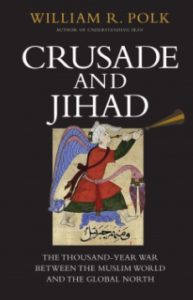
The subtitle of William Polk’s Crusade and Jihad really grabbed me: “The thousand-year war between the Muslim world and the Global North.” Maybe, I thought, THIS will help me understand the mess in the Middle East, the hatred of Muslims that is not only overt but seemingly encouraged under the current US Administration, and just the weirdness that surrounds religious conflict.
For starters, I am neither a Muslim nor a Christian, so I had not preconceived bias – but early on, I found myself thinking that a few very religious people I know would be reaching for the smelling salts by about the third page. The author’s extensive background (including roles as historian, policy planner, diplomat, peace negotiator, and businessman) and meticulous research are impressive, and the book is his attempt to “lay out in this book, as accurately as I could, what I think is actually so—not what we would like to be so…”
The book is extensively sourced and (be still, my librarian heart!) has an amazing index, so if there is a particular incident, individual, location, or other point of interest in the vast topic of Christian-Muslim history and relations, the reader can get right to it.
And, to be honest, by the time I was about 20% through the book, I had a flashback to 1968, when I was a history major in college, and became seriously depressed by my realization that history was just tales of who killed whom over and over, and that we were probably completely doomed – so I did what any disillusioned 19-year-old would do: I dropped out, got married, and read fiction for a few years. This book has MORE than enough detail for anyone with an interest in history, and I was woefully ignorant about MOST of what I learned while reading Crusade and Jihad. It’s not an easy read, but it is THOROUGH.
Although I had been a history major in college for a few years back in the 60’s, my retention was faulty enough that I only was vaguely aware of the history of Islam: I knew that after its beginning, Islam spread across North Africa into Europe, had a caliphate in medieval Spain, and was actually the “bright light in a European Dark Age.” But there was so much I didn’t know, and I had such huge gaps in awareness of the thousand years of battle. Polk labels the opposing sides as the “Global North and South,” and his book includes everything: Russian’s wars in the Caucasian Mountains, the Moro Rebellion, French rule in Algeria, the creation and rise of Hezbollah, and more, right up to Boko Haram, the Islamic State, the Taliban, and the ongoing disaster in Afghanistan.
Despite having spread throughout the Middle East, Africa, and into Southeast Asia, Islamic civilization (the Global South) began a decline at he same time that Europe (the Global North) began its overseas expansion. The Portuguese, Dutch, English, and Russians all participated in the defeat of Muslims, leading the conquered people to go so far as to try embracing Western concepts of dress, ideas, and armies. Then the 19th Century was basically a century-long assault of Muslims – from what seems like all sides. And finally we get to more recent history, where things have just totally convulsed in too many ways (for me) to comprehend.
TBH, it was too much for me, and while I really wanted to know more, perhaps not THIS much more. At the end of the book, what really had an impact was Polk’s frank discussion of the blindness many of us experience as we struggle to understand the hatred on both sides. One line really resonated with me: “An American newspaper editor once said that a dogfight on Main Street is more important than a war in a distant country.” America First, indeed. Very sad.
I suggested to a friend that they read the first 15-20% than move to the summary chapters, and skim the index to find any specific areas of interest. I don’t know many people who could really deal with the density and detail in this book.
But it is awesome, and I appreciate the opportunity to read this incredible book — thanks to Yale University Press and NetGalley – in exchange for my honest review. Five huge stars.
